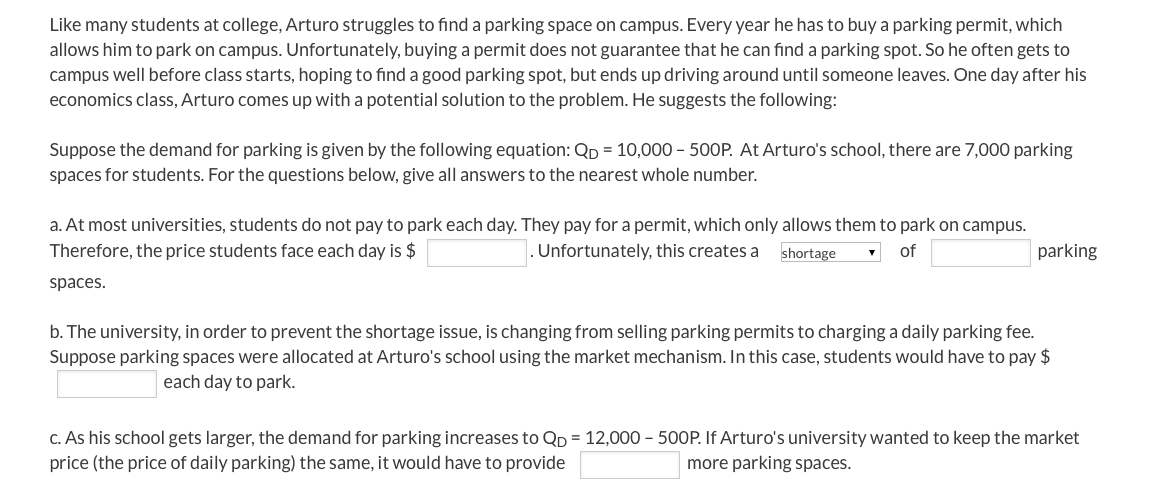Like many students at college, Arturo struggles to find a parking space on campus. Every year he has to buy a parking permit, which allows him to park on campus. Unfortunately, buying a permit does not guarantee that he can find a parking spot. So he often gets to campus well before class starts, hoping to find a good parking spot, but ends up driving around until someone leaves. One day after his economics class, Arturo comes up with a potential solution to the problem. He suggests the following: Suppose the demand for parking is given by the following equation: Qp = 10,000 – 500P. At Arturo's school, there are 7,000 parking spaces for students. For the questions below, give all answers to the nearest whole number. a. At most universities, students do not pay to park each day. They pay for a permit, which only allows them to park on campus. Therefore, the price students face each day is $ Unfortunately, this creates a shortage of parking spaces. b. The university, in order to prevent the shortage issue, is changing from selling parking permits to charging a daily parking fee. Suppose parking spaces were allocated at Arturo's school using the market mechanism. In this case, students would have to pay $ each day to park. c. As his school gets larger, the demand for parking increases to QD = 12,000 – 500P. If Arturo's university wanted to keep the market price (the price of daily parking) the same, it would have to provide more parking spaces.
Critical Path Method
The critical path is the longest succession of tasks that has to be successfully completed to conclude a project entirely. The tasks involved in the sequence are called critical activities, as any task getting delayed will result in the whole project getting delayed. To determine the time duration of a project, the critical path has to be identified. The critical path method or CPM is used by project managers to evaluate the least amount of time required to finish each task with the least amount of delay.
Cost Analysis
The entire idea of cost of production or definition of production cost is applied corresponding or we can say that it is related to investment or money cost. Money cost or investment refers to any money expenditure which the firm or supplier or producer undertakes in purchasing or hiring factor of production or factor services.
Inventory Management
Inventory management is the process or system of handling all the goods that an organization owns. In simpler terms, inventory management deals with how a company orders, stores, and uses its goods.
Project Management
Project Management is all about management and optimum utilization of the resources in the best possible manner to develop the software as per the requirement of the client. Here the Project refers to the development of software to meet the end objective of the client by providing the required product or service within a specified Period of time and ensuring high quality. This can be done by managing all the available resources. In short, it can be defined as an application of knowledge, skills, tools, and techniques to meet the objective of the Project. It is the duty of a Project Manager to achieve the objective of the Project as per the specifications given by the client.

Trending now
This is a popular solution!
Step by step
Solved in 2 steps


